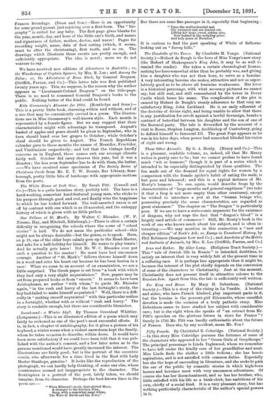Our Fellows at St. Mark's. By Walter C. Rhoades. (W.
P. Nimmo, Hay, and Mitchell, Edinburgh.)—There is often a certain difficulty in recognising the schools where the scene of "school stories" is laid. We do not mean the particular school—this might not be always desirable—but the genus, so to speak. Here, on p. 18, one of the elder boys calmly goes up to the Head-Master, and asks for a half-holiday for himself. He wants to play tennis ! And he actually gets leave ! Did Mr. W. C. Rhoades ever put such a question to his master? He must have had uncommon courage. Another of "St. Mark's" fellows throws himself down in a wood and cries his heart out because he has been beaten in a race! When we come to an account of an examination, we are a little surprised. The Greek paper is set from "a book with which they had only a very slight acquaintance." Now, papers may be set from prepared books or from "unseen." It seems to have been Aristophanes, an author "with whom," to quote Mr. Rhoades again, "in the rush and hurry of the last fortnight's study, the boy had failed to make himself acquainted." Well, there is a diffi- .culty in "making oneself acquainted" with this particular author in a fortnight, whether with or without "rush and hurry." The story is readable enough, but there are considerable blemishes.










































 Previous page
Previous page